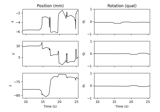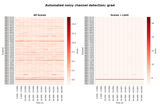mne.chpi.compute_chpi_locs¶
- mne.chpi.compute_chpi_locs(info, chpi_amplitudes, t_step_max=1.0, too_close='raise', adjust_dig=False, verbose=None)[source]¶
Compute locations of each cHPI coils over time.
- Parameters
- infoinstance of
Info The measurement information.
- chpi_amplitudes
dict The time-varying cHPI coil amplitudes, with entries “times”, “proj”, and “slopes”. Typically obtained by
mne.chpi.compute_chpi_amplitudes().- t_step_max
float Maximum time step to use.
- too_close
str How to handle HPI positions too close to the sensors, can be ‘raise’ (default), ‘warning’, or ‘info’.
- adjust_digbool
If True, adjust the digitization locations used for fitting based on the positions localized at the start of the file.
- verbosebool,
str,int, orNone If not None, override default verbose level (see
mne.verbose()and Logging documentation for more). If used, it should be passed as a keyword-argument only.
- infoinstance of
- Returns
- chpi_locs
dict The time-varying cHPI coils locations, with entries “times”, “rrs”, “moments”, and “gofs”.
- chpi_locs
See also
Notes
This function is designed to take the output of
mne.chpi.compute_chpi_amplitudes()and:Get HPI coil locations (as digitized in
info['dig']) in head coords.If the amplitudes are 98% correlated with last position (and Δt < t_step_max), skip fitting.
Fit magnetic dipoles using the amplitudes for each coil frequency.
The number of fitted points
n_poswill depend on the velocity of head movements as well ast_step_max(andt_step_minfrommne.chpi.compute_chpi_amplitudes()).New in version 0.20.

